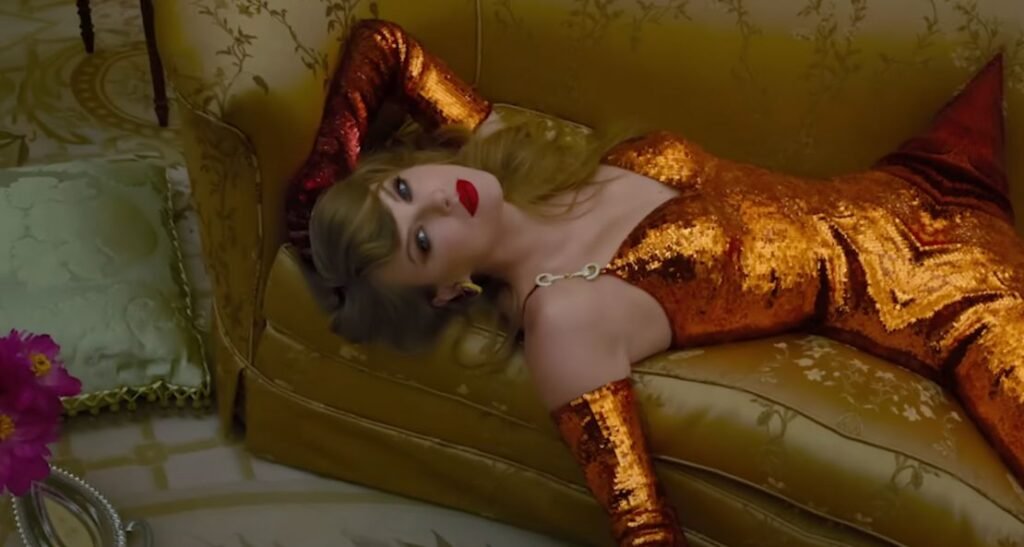Taylor Swift’s “Actually Romantic” from The Life of a Showgirl is not just another single. It is Swift flipping the script on a critic in real time.
She turns a feud into a flirt. Taylor Swift takes a jab, smiles, and turns it into a hook you can hum. That’s one particular kind of power move that only Taylor Swift could pull off with such sharp timing.
She sets the tone straight away with a raised eyebrow of an opener: “I heard you call me ‘Boring Barbie’ when the coke’s got you brave.”
“Actually Romantic” became instant debate fuel, and not only because Max Martin and Shellback lace it with rough-edged guitar and a clean, punchy mix.
The groove swings tight and slightly sour, the guitars scratch at the edges, and the drums stay dry so her asides cut through. It feels sly and unbothered, a small smile you hear rather than see. That light touch plays a big part.
It is the writing that everyone is chewing over. She fires off receipts, then twists them into something closer to a grin.
The chorus turns spite into flattery: “It’s actually sweet, all the time you’ve spent on me,” then, “It’s actually romantic,” and the kicker, “I really gotta hand it to you.” She even goes further with, “No man has ever loved me like you do.”
The Art of the Clap Back
Swift describes “Actually Romantic” as a love letter to someone who hates you. In release-week remarks, she called it about realising someone has “a one-sided, adversarial relationship” with you, and choosing to treat that fixation as attention. It is a neat explanation for the hook you hear.
The song addresses that one-way feud without bluster. Instead of anger, she reframes the obsession as praise, the resentment as a warped form of affection.
She spells it out in the bridge with a knowing shrug: “You think I’m tacky, baby, stop talking dirty to me,” and, “It sounded nasty but it feels like you’re flirting with me.” The flip lands because the performance stays light on its feet.
Who is Taylor Swift’s “Actually Romantic” About
Decoding the target has kept fans busy. She never names anyone, but the writing leaves breadcrumbs. There is the shock line about a diss song: “Wrote me a song saying it makes you sick to see my face.”
There is the quick cut to personal history: “High-fived my ex and then you said you’re glad he ghosted me.” Read together, they sketch a world where a peer has been sniping from the sidelines while watching her closely.
The ex reference pulls in the real-life web around Matty Healy. The reason listeners keep circling Charli XCX is simple.
Charli is married to The 1975’s George Daniel, which puts her close to that circle and makes the line sting harder for people who follow both artists. That is context, not proof, but it explains why the theory stuck.
A Double Target?
Some listeners think the song may widen its aim. A throwaway image about “funny valentines” has been tied by fans to Kim Kardashian’s 2018 stunt sending Valentine’s gifts to her “haters,” a list that included Swift. The lyric can hold that reading without taking the song off course.
The real trick is the way she keeps shrinking the menace until it looks silly. “Like a toy chihuahua barking at me from a tiny purse,” she sings, and the fight becomes a handbag prop.
She doubles down with, “I know you think it comes off vicious, but it’s precious, adorable.” The punchlines work because the production blends seamlessly.
“Actually Romantic” is written by Taylor Swift with Max Martin and Shellback, produced by the same trio, and mixed by Serban Ghenea.
The Genius of the Flip
Overall, it refuses to play by the expected rules of celebrity feuds. Instead of matching hostility with hostility, Swift employs a different strategy: overwhelming gratitude.
Thank you for the attention. Thank you for the effort. Thank you for caring enough to make me such a central part of your narrative.
It’s dismissive without being cold, victorious without being cruel. The song acknowledges the conflict while simultaneously refusing to treat it as serious enough to warrant genuine concern.
For an artist who’s spent years having her every move scrutinised, criticised, and analysed, “Actually Romantic” represents a kind of creative freedom.
If people are going to talk about you anyway, why not control the narrative? Why not turn their obsession into your punchline?


